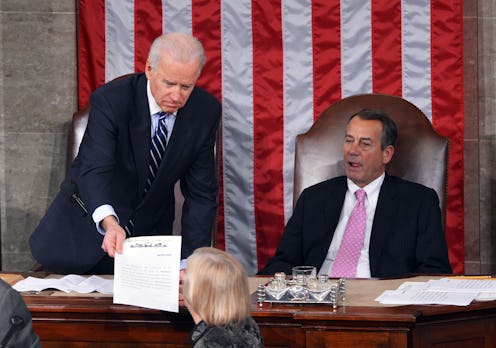News
The Electoral College Vote Is Counted On Jan. 6

The Electoral College vote is said and done, but technically we don't know the final, official results yet. There were plenty of reports on faithless electors after they cast their votes in their respective state capitols on Dec. 19. Only two Republicans decided to vote for someone besides president-elect Donald Trump. But there are still reasons to pay attention to the results. So what time is the Electoral College result coming out? The joint session of Congress where the votes are counted will be called to order by president of the Senate, Joe Biden, at 1 p.m. on Friday, Jan. 6, and it will be broadcast live.
In theory the final results are easy to tabulate. You could do so at home as the tellers read the results from each state individually. After the session begins, the the Certificates of Vote are opened and Biden hands them to select senators and representatives alphabetically to be entered into the congressional record. When they finish, the math would tell the story. But there's more to the process: a few more kinks can happen before Trump is crowned the Electoral College winner once and for all. There's one way to challenge the count, and it has only been attempted twice in U.S. history.
This would be an objection. After the results are announced, but before they become official, Biden asks if there are any objections. If at least one senator and one representative — that is one person from each body of Congress — object to all or part of the vote, then the joint session of Congress ends and the Senate and House meet separately to debate the objection. They have up to two hours to do so and then they vote. Only if both the House and Senate choose to accept the objection are the Electoral College votes in question thrown out.
This has happened twice in history, but neither time was it effective in changing the result of the race. In 1969, when Richard Nixon won the presidency against Democrat Hubert Humphrey and segregationist George Wallace, there was an objection over a vote from a faithless elector. It was rejected.
The next time wasn't until 2004. Ohio representatives and California Sen. Barbara Boxer objected to Ohio's electoral votes to protest what they saw as irregularities in the vote. Not necessarily to change the outcome of the election (George W. Bush beat John Kerry), they said at the time, but to bring attention to the need for electoral reform.
Now there's a very real possibility this could happen again. Even if it ultimately results in Trump being president, it would show once again that he doesn't face huge levels of support and doesn't have a mandate. So tune in to C-SPAN on Jan. 6. It could quickly get interesting.